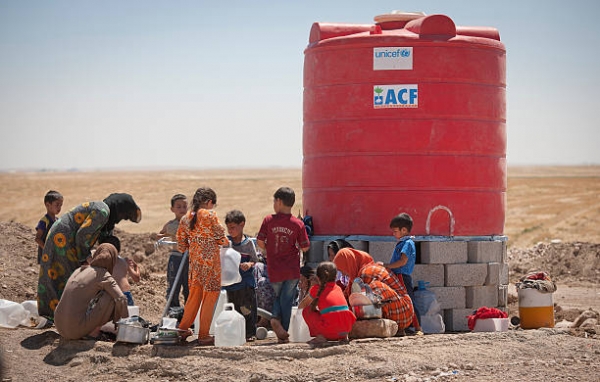The COVID-19 pandemic has been a further and powerful reminder of the critical significance of water and water infrastructure. While preventive measures recommend that everyone washes their hands frequently to reduce the risk of contagion, conflict-affected populations often have to deal with scarce access to water, and are, therefore, more exposed to the risk of contracting the disease. In fact, the pandemic has not stopped attacks on water resources and installations.
Water infrastructures are often used as weapons of war or methods of warfare, in spite of international law forbidding such practices, as water-related infrastructures are civilian objects. When water facilities are not deliberately targeted, they may still be damaged as a consequence of an armed conflict. Attacking water facilities results in spreading malnutrition and disease while hospitals and schools struggle to function. Therefore, due to the critical importance of safe drinking water and hand-washing facilities, the pandemic will not be overcome until safe water is provided to civilians in conflicts.
The Conflict and Environment Observatory has published an article underlining the importance of access to water for civilians in conflict zones while also presenting the “Geneva List of Principles on the Protection of Water Infrastructure,” published by the Geneva Water Hub and The Platform for International Water Law. This is a centre at the University of Geneva that was established to foster the prevention of attacks at water installations in conflict zones and promote water as a tool for peace and cooperation. Its work also focuses on researching and understanding the impact of weaponizing infrastructure, such as attacks against water facilities, on the civilian population, health facilities and their personnel and the environment.
The Geneva List of Principles on the Protection of Water Infrastructure (GLP) was intended to reinforce the knowledge and the implementation of international humanitarian law (IHL) concerning water and water infrastructures. Its main objective, therefore, is to provide a guide that collects in one document all the norms related to the protection of water facilities in conflict situations. In order to do so, the reference document gathers relevant information from different branches of international law, including human rights law, environmental law and international water law, together with other relevant United Nations Security Council resolutions concerning deliberate attacks on a water supply. The GLP also wants to stress the relationship between water, health care, the environment and post-conflict peacebuilding.
Using water as a weapon against civilians – carrying out deliberate attacks at water facilities – is not only a violation of international law as it prevents civilians from accessing an essential resource, but it also increases the risk of contracting COVID-19 as the population cannot comply with preventive measures. The pandemic should, therefore, shed light on the importance of safeguarding water and water infrastructure in areas of conflict, where civilians are being disproportionately affected by the pandemic, inviting all actors involved to take action.
To know more, please read:
ceobs.org/covid-19-shows-why-protecting-water-in-conflict-is-vital/
Author: Laura Manzi; Editor: Andrew Goodell







